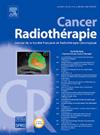III期黑色素瘤淋巴结野外放疗和免疫疗法的辅助治疗效果。
IF 1.4
4区 医学
Q4 ONCOLOGY
引用次数: 0
摘要
目的:随着免疫疗法在III期黑色素瘤患者中取得良好疗效,必须重新评估切除术和完全淋巴结清扫术后辅助放疗的作用。我们对已切除的III期黑色素瘤患者接受辅助放疗和免疫治疗与仅接受免疫治疗的结果和安全性进行了评估:这项回顾性单机构研究纳入了2019年1月至2022年12月期间接受完全淋巴结清扫和辅助免疫治疗的III期黑色素瘤患者。在淋巴结清扫区域完成免疫治疗和辅助放疗的患者被定义为放疗联合免疫治疗组。主要终点是无病生存期。次要终点为局部进展、3级或以上不良反应发生率以及局部复发风险高的患者的无病生存率:共纳入 33 名患者。结果:共纳入 33 例患者,其中 12 例接受了淋巴结野辅助放疗。中位随访时间为 17 个月(8-45 个月)。接受放疗和免疫疗法的患者的疾病分期明显较高,囊外扩展也更为常见。12个月时,单独接受免疫疗法的患者无病生存率为66.7%(95% CI:42.5-82.5%),接受放疗和免疫疗法的患者无病生存率为83.3%(95% CI:48.2-95.6%;P=0.131)。接受免疫疗法的患者局部进展率为24%,接受免疫疗法和放疗的患者局部进展率为8%(P=0.379)。辅助治疗后,6%的患者出现了3级或以上免疫治疗相关事件,没有患者出现3级或以上放疗相关不良事件:结论:在III期黑色素瘤患者中,淋巴结野辅助放疗联合免疫治疗似乎能延长无病生存期,且耐受性可接受。然而,这些结果还需要长期和前瞻性研究来证实。本文章由计算机程序翻译,如有差异,请以英文原文为准。
Outcomes of adjuvant lymph node field radiotherapy and immunotherapy for stage III melanoma
Purpose
With the promising results of immunotherapy in patients with stage III melanoma, the role of adjuvant radiotherapy after resection and complete lymph-node dissection must be reassessed. We evaluate the outcomes and safety of adjuvant radiotherapy and immunotherapy compared to immunotherapy only in patients with resected stage III melanoma.
Patients and methods
This retrospective and single institution study included patients treated for a stage III melanoma with complete lymph-node dissection and adjuvant immunotherapy from January 2019 to December 2022. The radiotherapy associated with immunotherapy group was defined by completion of immunotherapy and adjuvant radiotherapy in the lymph-node dissection area. The primary endpoint was disease-free survival. The secondary endpoints were locoregional progression, incidence of adverse events grade 3 or above and disease-free survival rate in patients with high risk of locoregional recurrence.
Results
Thirty-three patients were included. Among them, twelve received adjuvant lymph-node field radiotherapy. The median duration of follow-up was 17 months (range: 8–45 months). Patients receiving radiotherapy and immunotherapy had a significantly higher disease stage and more frequent extracapsular extension. At 12 months, the disease-free survival rate was 66.7 % for the patients receiving immunotherapy alone (95 % CI: 42.5–82.5 %) and 83.3 % for those receiving radiotherapy and immunotherapy (95 % CI: 48.2–95.6 %; P = 0.131). The locoregional progression rate was 24 % in patients receiving immunotherapy and 8 % in patients receiving immunotherapy and radiotherapy (P = 0.379). After adjuvant treatment, 6 % of patients developed grade 3 or above immunotherapy-related events and none developed grade 3 or above radiation-related adverse events.
Conclusion
In patients with stage III melanoma, adjuvant lymph-node field radiotherapy combined with immunotherapy seems to be associated with longer disease-free survival, with acceptable tolerance. However, these results need to be confirmed by long-term and prospective studies.
求助全文
通过发布文献求助,成功后即可免费获取论文全文。
去求助
来源期刊

Cancer Radiotherapie
医学-核医学
CiteScore
2.20
自引率
23.10%
发文量
129
审稿时长
63 days
期刊介绍:
Cancer/radiothérapie se veut d''abord et avant tout un organe francophone de publication des travaux de recherche en radiothérapie. La revue a pour objectif de diffuser les informations majeures sur les travaux de recherche en cancérologie et tout ce qui touche de près ou de loin au traitement du cancer par les radiations : technologie, radiophysique, radiobiologie et radiothérapie clinique.
 求助内容:
求助内容: 应助结果提醒方式:
应助结果提醒方式:


